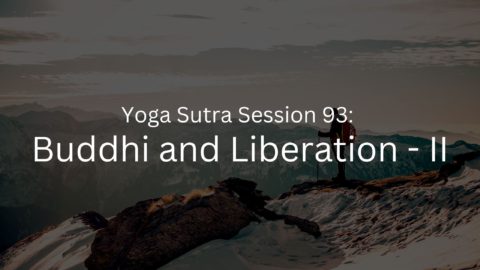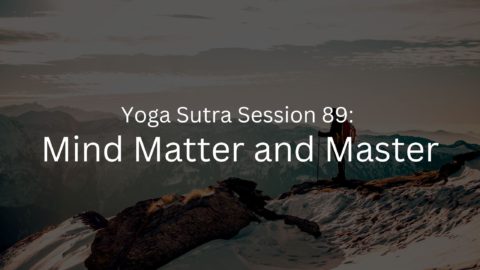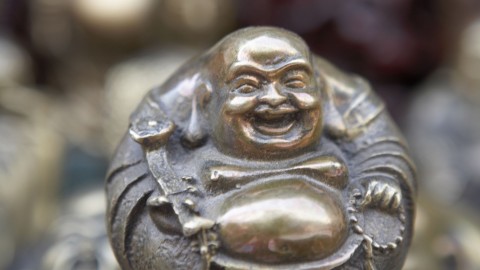We will have a few questions from Yoga Sutra 21.
HOW DOES A BUDDHA PARTICIPATE TOTALLY IN DAY-TO-DAY LIFE?
THERE is no “how” to it. When you are alert no “how” is needed. When you are awakened you act spontaneously, not with a plan in the mind, because now there exists no mind at all. A Buddha responds – moment to moment.
Whatsoever the situation demands, with no plan, no idea how to act, with no technique he simply responds. His response is like an echo: you go to the hills, you make noise, and the hills echo it. Have you ever asked how the hills echo?
They respond. When you play on a sitar, has the sitar any “how”? You may be having technique and things in the mind – what to play, what to sing – but the sitar? It simply responds to your fingers.
A Buddha is a nothingness. You come around him; he responds. Remember the word “responds”: it is not a reaction; it is a response. When you react you have an idea in the mind – how. what. When you react you react from a position. If you come to a Buddha he does not react from any position; he has none. He has no prejudice, no opinion, no ideology. He responds. He responds to the situation.
One day a man came and asked, “Does God exist?” Buddha looked at him and said, “No.” And the same day. in the afternoon. another man came. He asked. “Does God exist?” Buddha looked into him and said, “Yes.” And the same day, in the evening, a third man came. He asked, “Does God exist?” and Buddha remained quiet; he didn’t answer.
If he had a position in the mind then the answer would be consistent, because it is not a response to the situation: it is always born out of an idea in the mind; it will be consistent. If he was an atheist, not believing in God, then whosoever the questioner it makes no difference. In fact a man of ideology never looks at you, never looks at the situation. He has a fixed idea. An obsession really. Buddha would have said, “No!” if he was an atheist, to all the three persons. If he was a theist he would have said, “Yes,” to all the three persons. In fact, for a alive person the situation becomes irrelevant when you have an ideology, a position, a prejudice, a pattern, a mind; then you don’t look at the situation.
Otherwise, the responses will be totally different. There will be a deep running consistency – consistency of being, not of answers. Buddha is the same when he said no. Buddha is the same when he said yes. Buddha is the same when he didn’t say anything and remained silent, but the situations were different.
Buddha’s disciple Anand was present in all the three situations. He became confused. Those three persons didn’t know anything about the two other answers that Buddha had given, but Anand was present in all the three situations. When Buddha was going to lie down on the bed in the night Anand said, “One question. Why did you answer the same question in three ways, inconsistent, contradictory?”
Buddha said, “I have not given any answer to you – you need not worry. You can ask your question and I will answer you. Those answers were not given to you. Who are you to come in?” An answer is given to a situation. When the situation changes, the answer changes. It is a response.
Buddha said, “The first man who asked was an atheist. In fact he was not an inquirer. When I looked in him he had a position – he has already achieved, arrived. He has concluded: he has concluded that there is no God. He had come only for a confirmation from me so that he can go and say to people, ‘Buddha also believes the same way I believe: that there is no God.’ I had to say no to him.
The man who came in the afternoon was also with a conclusion. He was a theist, a staunch, orthodox theist – he believed that God exists. He had also come with the same mind, to be confirmed.
The third man who had come was without any position, with no mind. He was an inquirer. He didn’t believe in anything: he had not arrived. He was on the way; he was pure. I had to remain silent with him. Now, if you have the same question, you can ask.”
A response will always be different, and yet deep down will be a running current of being. Always Buddha looks into the man, into the situation. The situation decides – not Buddha’s mind; he has none.
So you ask, “Wow does a Buddha participate totally in day-to-day life?” If you try to participate totally it will not be total: no effort can ever be total. No technique can ever be total, because you will be manipulating. You will be separate from it; you will be trying to be total. How can you try to be total? You can relax; only then totality comes into being. You are in a let-go; then you are total.
Totality is not a discipline. All disciplines are partial. That’s why a man who is much too disciplined will never reach the truth, because he will always be carrying the burden – doing something continuously: gross or subtle, on the surface or in the depth, but always a doer. No, Buddha is not a doer. In fact when you relax there is no other way to be – the only way left is to participate totally.
It has no “how” to it, but the question arises in your mind because you don’t know what awareness is. It is just as a blind man asks, “How do people who have eyes move without a stick in their hands to grope their way?” If you tell him that they don’t need any sticks, that they don’t need groping, he will not be able to believe. He will laugh. He will say, “You are joking. How is it possible? Do you mean to say that men with eyes simply move without groping?” A blind man cannot understand it. He has no experience of it. He has always been groping and groping and, even then, stumbling again and again and falling. He has been somehow managing. A Buddha does not manage: he is in a let-go and everything fits together on its own accord.
Tags: Participate Totally Patanjali










